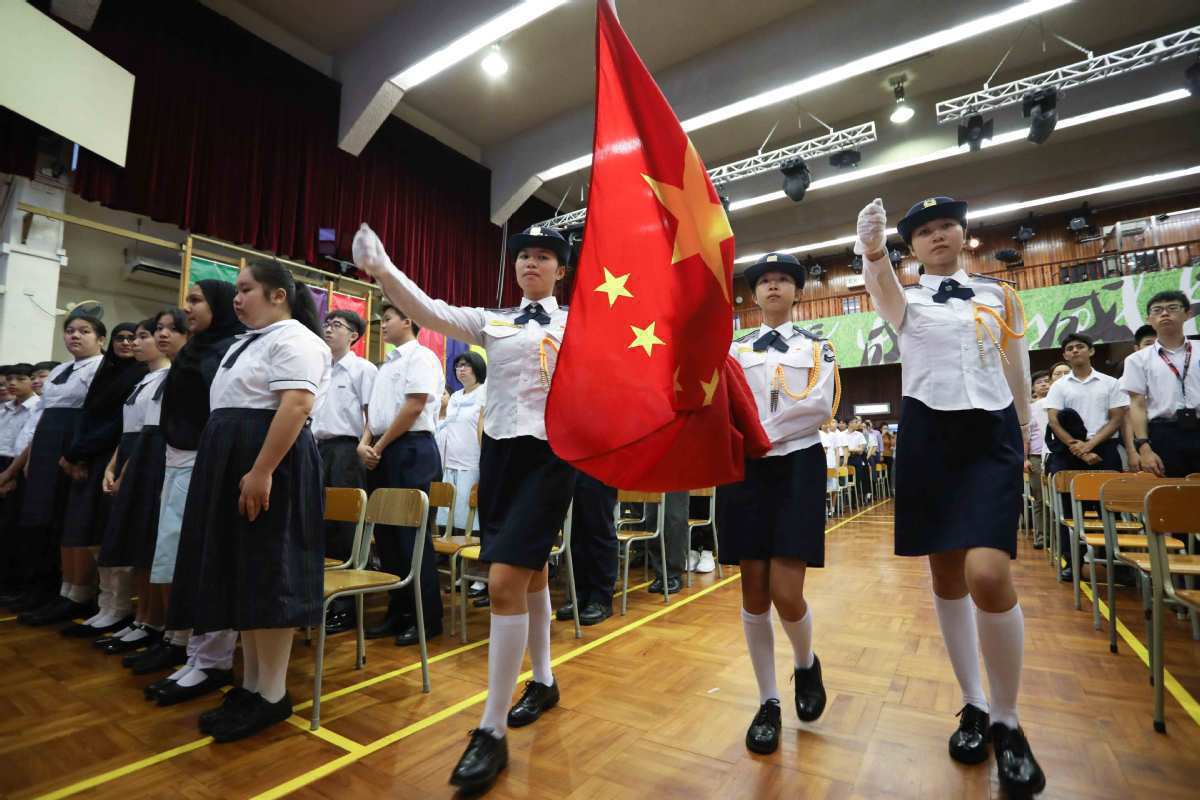
Students from a school in Tung Chung, New Territories, Hong Kong Special Administrative Region, kick off a new semester by holding a flag-raising ceremony on Sept 2, 2019. (Photo: China Daily)
Education on the national flag and emblem in Hong Kong can be set on the right course as the city is about to amend its National Flag and National Emblem Ordinance, which highlights such education, prominent Hong Kong educators and political figures said.
They agreed the amendments can foster stronger national feelings among the youth, helping them to fend off the separatism talk advocated by some opposition activists and unprofessional teachers in the city.
The amendments, which will soon be presented to the Legislative Council for deliberation, follow a revision to the National Flag Law and the National Emblem Law by the Standing Committee of the 13th National People's Congress. Under that revision, education on the flag and emblem should be an essential part of patriotic education, and schools should teach students about their history and significance.
The law also further bans acts that undermine the dignity of the flag and emblem, such as displaying the flag upside down.
The two national laws concerned were listed in Annex III to the Basic Law on July 1, 1997, and would be applied in Hong Kong through the ordinance.
The special administrative region government said in a statement Saturday evening that it will introduce amendments to the ordinance to fulfill its "constitutional responsibility".
Lawrence Tang Fei, principal of Hong Kong's Heung To Secondary School in Tseung Kwan O, expected that the amendments can help local schools to "standardize" their curriculum on national symbols.
Currently, Tang said, teaching materials on national flags and national emblems are mainly designed by local schools, and teachers have been given free hand on what to teach in the lessons.
Proper lesson material has been incorporated in the local curricula of different subjects, and the Education Bureau provides related curriculum resources and professional development programs for teachers, according to the bureau.
"But some teachers are not even sure what the four smaller stars in the national flag stand for," Tang said. "So they just teach their students about what they think is right."
That the importance of education on national symbols is clearly stated in national legislation, Tang said, sends a clear message to teachers that they should no longer neglect their responsibility. Tang added that he is confident that local schools will now pay more attention to safeguarding the quality of national education and better cultivate students' sense of belonging to the nation.
Ho Hon-kuen, chairman of Education Convergence, a local educators group, said the central government's amendments give those involved in local education-including school sponsoring and management bodies, principals and teachers-"a good push" to reach consensus on how to implement national education.
"It is my understanding that there is a local school that plans to implement its own national security education curriculum for students, but it ends up facing intimidation and smear campaigns by local opposition media tabloids, such as Apple Daily," Ho said.
Ho said it is a teacher's duty to equip students with knowledge about their nation. "If there is a legal basis that encourages all local schools to start their national education, I am sure more schools will be more willing to play an active part in this," he said.
Lau Siu-kai, vice-president of the Chinese Association of Hong Kong and Macao Studies, said the new amendments can have a deterrent effect on some radical opposition lawmakers in Hong Kong, preventing them from setting a bad example for the young people in the city.


